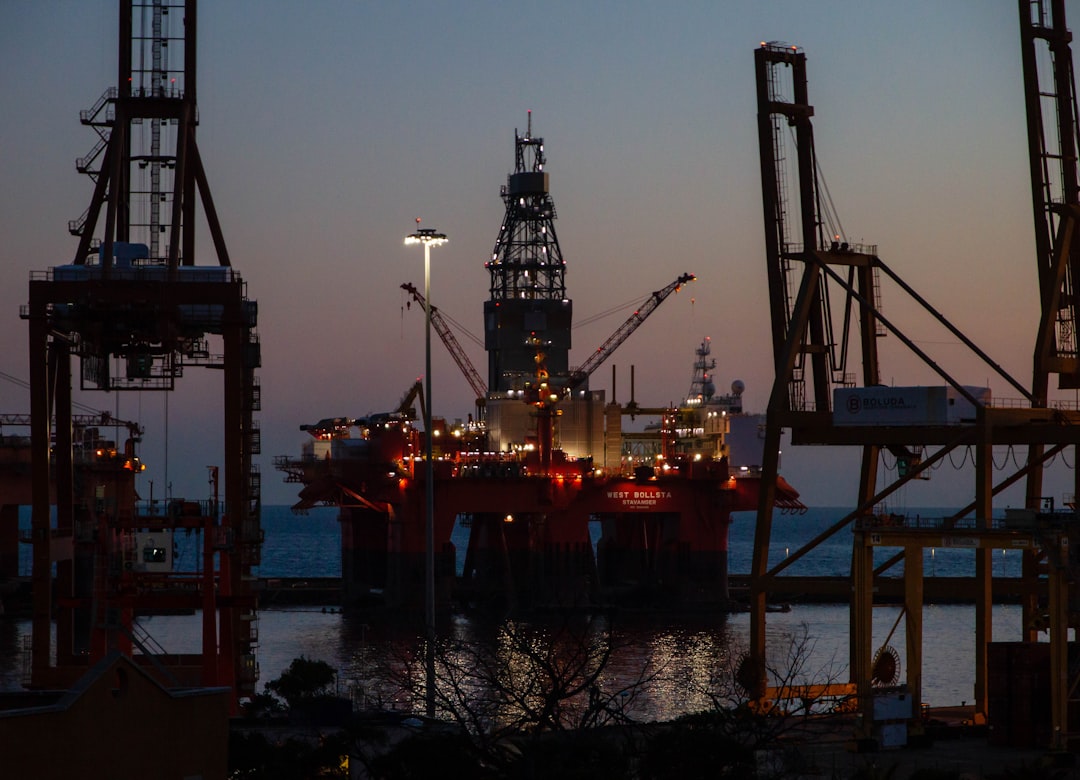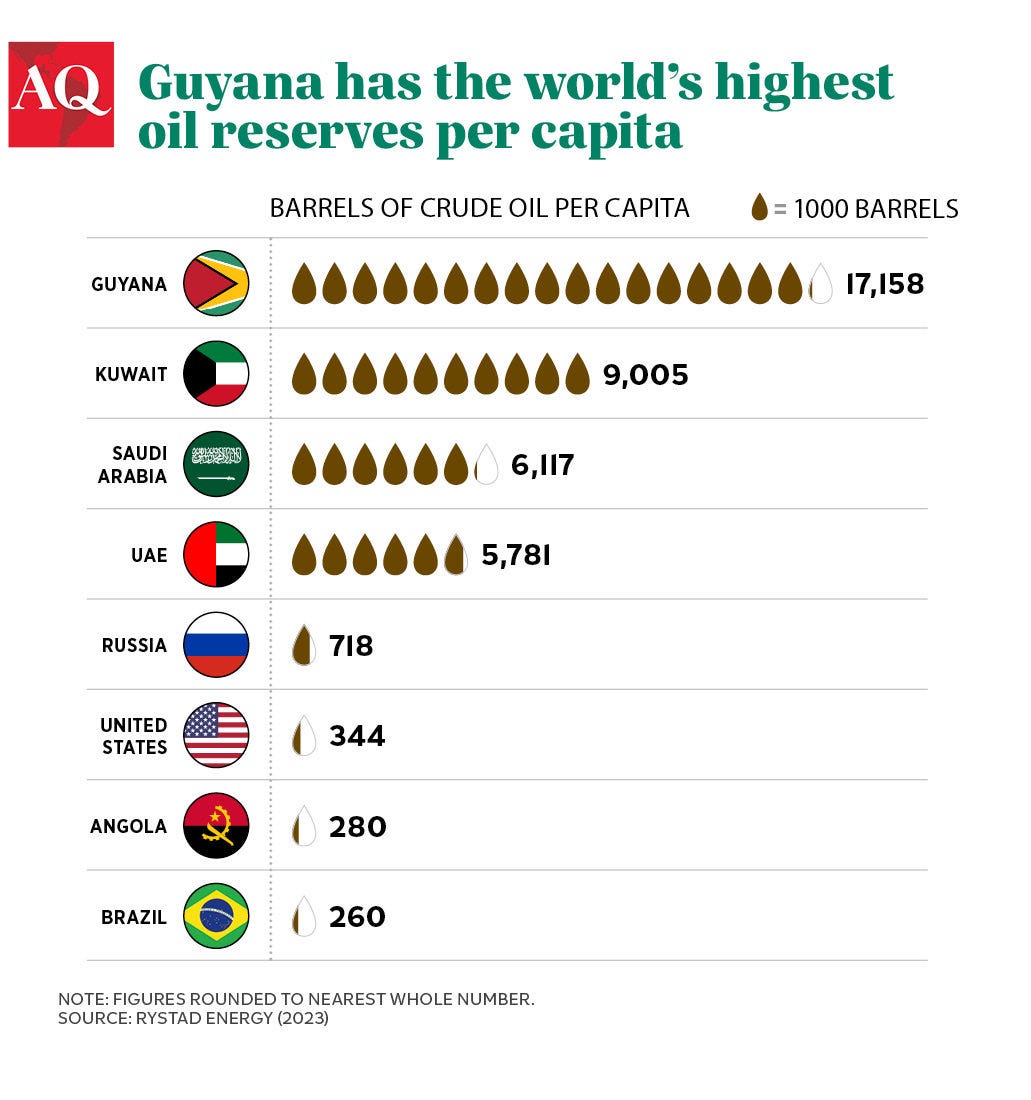The Ultimate Windfall
Is Guyana ready?

Guyana. One of those words that gives nearly everyone the same reaction: “That’s a country, right? In Africa… or Asia… or somewhere.” That’s about to change. Why? Because Guyana is primed to become one of the wealthiest nations on earth.
For the record, Guyana is a small country on the North Coast of South America, just East of Venezuela. It was originally colonized by the Dutch, but was an English colony for the 19th and 20th centuries, until gaining independence in 1966. The country is populated mainly by the descendants of Indian indentured workers and African slaves, although about 10 percent of the population is indigenous. The government is classified as a flawed democracy by the Economist Intelligence Unit, with a score similar to Serbia and the Dominican Republic. The country itself is a decent size (about twice the size of Tennessee), but the population is very small. Less than 800,000 people call Guyana home, about the same number as live in Greater Omaha.
Guyana didn’t get a lot of attention until 2015 when oil was discovered off the coast. A lot of oil. This wasn’t your standard oil discovery, it was one of the biggest in the last 50 years. Initially, estimates were that there were a whopping 11 billion barrels of oil were discovered off the coast. That has since been increased to 13.6 billion barrels, and there may be still more to come. Combined with Guyana’s small population, Guyana now has the most oil per capita of any country, and it isn’t even close.
It’s taken some time to develop the oil fields, but now the money is pouring in. Oil production has gone from around 1,000 barrels of oil per day to over 250,000 barrels per day. Plans are for Guyana to be above 1.6 million barrels per day by 2030. A country that was a minnow in the oil industry is about to become a leviathan. In 2022 alone, the country took in over a billion dollars in oil revenues. It’s hard to accurately track just how fast Guyana’s economy is growing, but according to the IMF, they should go from a GDP per capita of $11,000 to $70,000 by the end of 2024. That would make Guyana the second wealthiest country in the Americas and on track to pass the United States by 2027. This is the type of windfall that few places have ever experienced.
And everyone lived happily ever after. Right?
Unfortunately, being on the receiving end of one of the largest windfalls of all time does not mean Guyana will be able to forever bask in riches. Just ask little Nauru, a country that itself had a rags-to-riches-to-rags experience in the late 20th century. Guyana needs to be very, very careful. Other countries that discover oil often descend into kleptocracy where only a select few benefit and the majority stay poor. Additionally, Oil is on its way out as the world transitions to other sources of energy. The country needs to husband its wealth and plan for the future.
So, if I were philosopher-king (or warrior poet) of Guyana, what would I do?
First, make sure everyone’s basic needs are being met. No one should be malnourished or without a roof over their heads. Set up a welfare structure, possibly using a universal basic income, to make sure all citizens will no longer be worried about where their next meal is coming from.
Second, invest in education. The use of oil will probably remain for some time, but the age of oil is likely in its final decades. By 2070, I expect the world’s consumption of oil to be much smaller than it is today. 2070 may sound far off, but it’s less than 50 years away. The median age in Guyana is only 26 years old, so most Guyanese today will still be alive when oil does not provide the money it does now. Guyana, like other oil nations, will have to move on and produce other goods and services that the world values. The best way to do so is to have an educated population. By investing heavily in schools today, Guyana can make sure that when oil revenues slow down, the people living there are smart enough to build new industries.
Third, develop a sovereign wealth fund. Several countries with vast oil wealth, notably Norway and Saudi Arabia, have deposited large amounts of money into a fund whose earnings can be spent on citizens. Sovereign wealth funds are public. By using one, people can keep an eye on the money and make sure it isn’t being stolen. With such a small population, even a modest fund can provide a significant boost of government spending in perpetuity.
Fourth, invest in infrastructure. Pave roads. Upgrade airports. Enlarge ports. Make sure everyone has access to the internet. Do so wisely and only where they are needed. Avoid white elephant projects where millions are wasted making shiny new buildings. Instead, spend every dollar in such a way that it enables additional dollars to be created.
Guyana has a marvelous opportunity to be the first nation on earth to go from poor to rich in under a decade. If they succeed, the country will look like a Norway in the tropics. It would be a place of stability and prosperity, a place of democratic values where almost all citizens have a relatively peaceful life. If they fail, Guyana will look like Equatorial Guinea, a small African country where billions of dollars of oil money have gone to the top one percent, while the rest of the country lives on less than $10 per day. Success will require restraint, honesty, and hard work. I hope they are up for it.



What about the recently approved referendum in Venezuela to annex a huge chunk of Guyana? Obviously that "vote" was rigged and probably just a political tool for the dictator to gain support, but should still be taken seriously.
If I was a US Gov economic strategist, I'd be offering protection to Guyana in exchange for trading deals. But what do I know... What do you think?